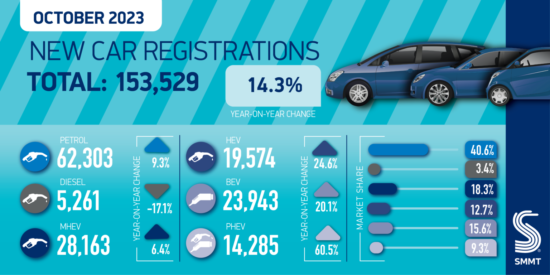New car sales growth continues in October – SMMT revises annual outlook upwards

October’s new car market grew by 14.3 per cent to reach 153,529 registrations, 7.2 per cent above pre-pandemic levels and marking the best performance for the month since 2018, according to the latest figures from the Society of Motor Manufacturers and Traders (SMMT).
The 15th month of consecutive growth was driven almost entirely by large fleet registrations, which grew 28.8 per cent to reach 87,479 units. Private demand was stable at 62,915 vehicles, a 0.3 per cent increase, while the much smaller business sector saw registrations fall -15.2 per cent to 3,135 units. With the sustained increase in new car registrations, overall vehicle uptake is now up 19.6 per cent in the first 10 months, with the market currently enjoying its best year since 2019.
Electrified vehicle uptake continued to accelerate in October accounting for 37.6 per cent of all new car registrations. Hybrid electric vehicles (HEVs) grew 24.6 per cent to reach 19,574 units, while plug-in hybrid vehicles (PHEVs) recorded the highest proportional growth, up 60.5 per cent to 14,285 registrations. Battery electric vehicle (BEV) uptake increased for the 42nd month in a row, by 20.1 per cent to 23,943 units. Given overall market growth, however, this amounted to a BEV market share of 15.6 per cent, a relatively small rise from last year’s 14.8 per cent. Furthermore, private registrations accounted for fewer than one in four new BEVs this year, underscoring the need for fiscal incentives for private consumers. Year to date, BEV volumes have risen 34.2 per cent to account for 16.3 per cent of new registrations this year, up slightly from 14.6 per cent this time last year.
With EV uptake greatly influenced by perceptions of chargepoint infrastructure availability and accessibility, action should be taken to ensure more equitable distribution and pricing for public charging. Reducing VAT on public charging to match home use would mean those unable to install their own chargepoint – typically those in flats, terraces and rented accommodation – would avoid paying four times the tax paid by those who can – typically those who own houses with off-street parking. Binding targets for chargepoint rollout, in line with those set for the car market by the Zero Emission Vehicle Mandate and supported by the necessary changes to planning and grid connections so desperately needed, would also help accelerate installation, giving consumers confidence in being able to charge when and where needed.
Mike Hawes, SMMT chief executive, said: “With demand for new cars surpassing pre-pandemic levels in the month, the market is defying expectations and driving growth. As fleet uptake flourishes, particularly for EVs, sustained success depends on encouraging all consumers to invest in the latest zero emission vehicles.
“The Autumn Statement is a key opportunity for government to introduce incentives and facilitate infrastructure investment. Doing so would send a clear signal of support for drivers, reassuring them that now is the time to switch to electric.”
The latest market outlook has been revised upwards to reflect market growth higher than expected. Overall new car registrations are anticipated to reach 1.886 million by the end of the year, a rise of 2.1 per cent on July’s expectations. However, expectations for BEV uptake have been downgraded again slightly, by -1.7 per cent to 324,000 units resulting in an expected market share at year end of 17.2 per cent.
Looking ahead to next year, the overall market outlook for 2024 is marginally more positive than previously anticipated, up 1.0 per cent to 1.970 million units (a 4.4 per cent rise on the 2023 outlook). With an absence of consumer incentives and an overwhelming dependency on fleet registrations for growth, however, BEV market share outlook has been revised down slightly to an expected market share of 22.3 per cent, despite registrations expected to reach 439,000 units, a 35.5 per cent increase over 2023.
Deloitte: more focus needed on EV purchase barriers
Jamie Hamilton, automotive partner and head of electric vehicles at Deloitte, said: “While car purchases have increased, the marginal growth of private sales compared to fleet sales, will be a concern for the industry. This isn’t surprising – the cost-of-living crisis having eroded consumer spending power and pushed many to delay major purchases.
“A survey of 3,100 respondents in the Deloitte Consumer Tracker revealed that the percentage of UK consumers planning to buy a new car in the next three months has fallen from 5.4 per cent in Q2 to just 4.3 per cent in Q3.
“Even though the number of EV models available is increasing, price remains an issue for some consumers. A more established used car market for EVs will also allow more certainty around residual values, helping to offer competitive pricing as cost conscious consumers continue to face financial pressures.
“With growth of EV sales among private consumers stalling, there needs to be more focus on removing the main barriers preventing the average consumer from contemplating a switch to electric. This includes continued improvement in the underlying charging infrastructure which will also be crucial if growth is to keep up with the rising sales thresholds the government has mandated for subsequent years.”


Comments